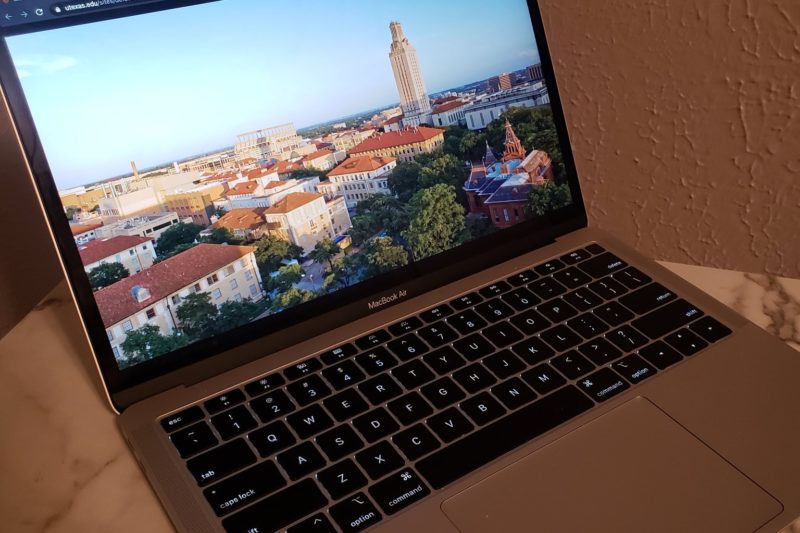Emergency fund helps UT students make ends meet after COVID-19 setbacks
By Mercedes Gonzales
Photography By Grace Dennis
Reporting Texas

The emergency fund distributed 322 laptops to students
AUSTIN, TX — As the University of Texas at Austin goes into its third week of online classes, some students are dealing with financial situations that make it hard to focus on classes.
Students have lost their jobs because of the coronavirus pandemic and struggle to pay rent and get groceries. Some have experienced their computers breaking in a time that they need it more than ever. Or, they moved back home and do not have wireless access to their classes. The Student Emergency Fund, run by the Office of Dean of Students, aims to provide financial support so students can focus on classes.
“We have a lot of great support from the university to make sure that we have the resources that we need to help students,” Sara Kennedy, the Director of Strategic and Executive Communications for the Office of the Dean of Students said. “But our current circumstances are unlike anything else that we’ve ever experienced and donations make it possible for us to do things.”
The emergency fund is funded in part by donations on HornRaiser. Nearly $876,000 went to help students with rent and groceries. Approximately $100,000 went to help students gain technology access, such as Wi-Fi. 322 laptops were also distributed to students using this fund.
The Office of the Dean of Students said they received almost 2,000 applications for the fund since March 17, compared to 315 applications overall in the 2018-2019 school year. To meet the increased demand of applications, Kennedy said they had to increase their small case worker staff of nine people to 25. They pulled staff from other departments in the Division of Student Affairs and trained them to meet the demand.
“That’s a big part, is really trying to provide some security and stability for our students through that financial support so that they have what they need to get to class,” Kennedy said. “We know our students need help now and we don’t want them to wait any longer than they have to.”
William Hall, a third-year marketing student, applied to the emergency fund to help pay his rent. Hall lost his job as a referee for UT Intramural Sports when the university shifted classes online. He found out about the fund when he was sent a link to it in a group chat.
All students can apply for the fund online at deanofstudents.utexas.edu. The Dean of Students removed the usual $300 award amount cap. After a staff member calls you for more information, the application is sent to the Office of Scholarships and Financial Aid for approval.
“When I kept reading that it was like, no, $300 limit and that it’s not a loan, I was like, okay, let me fill this out, ” Hall said.
Kennedy says that the Office of the Dean of Students is also connecting them to the Texas One Stop, a new web page for students to find answers to their tuition, financial aid, transcript ordering questions and more to mitigate any issues that could arise during the process.
The student emergency fund also supports students by providing them technology to access their online classes.
Grace Dennis, a third-year psychology student, applied for the money when her laptop broke after spring break. The laptop would take a full day to turn on and Dennis began to fall behind in her courses. She faced a $700 bill to replace her computer through Apple. But, through the Student Emergency Fund, Dennis got approved for a new laptop at no cost.
“It just felt a little bit weird that I just got like a free computer out of nowhere,” Dennis said, adding, “I’m definitely just grateful that I got a laptop replacement.”
Hall was in disbelief when he got $1,059 from the fund to cover rent for the month. He also got an extra $200 for anything else he may need.
“I don’t have to stress about that expense right now,” Hall said. “That’s because UT helped.”
For Kennedy, it’s not just the emergency fund or Office of Dean of Students that are helping students during this challenging time. It’s also the people who donate to the fund’s Hornraiser.
“They made it possible for us to meet this need in a way that we would not be able to [otherwise], without that community support and those donations.” Kennedy said.